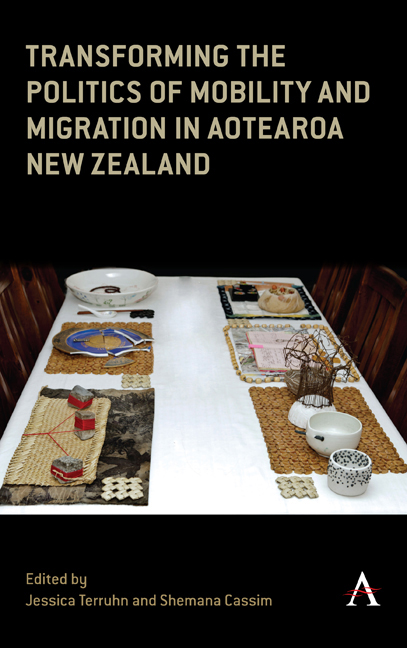Book contents
- Frontmatter
- Contents
- Acknowledgements
- Contributors
- Glossary of Te Reo Māori Words
- Glossary of Te Reo Māori Place Names
- Glossary of Other Non-English Words
- List of Tables
- List of Figures
- Introduction: Reimagining the Politics of Mobility and Migration Through Decolonisation, Social Justice and Solidarities
- Cover Artwork: A Place at the Kauri Table Revisited … 2021
- Part One Decolonising the Politics of Migration
- Part Two Humanising the Politics of Transnational Mobility
- Part Three Building Solidarities for Migrant Rights and Belonging
- Conclusion: Towards Transforming the Politics of Mobility and Migration in Aotearoa New Zealand
- Index
Interview: Race Relations and Migration in Aotearoa New Zealand – An Interview With Race Relations Commissioner Meng Foon
Published online by Cambridge University Press: 28 February 2024
- Frontmatter
- Contents
- Acknowledgements
- Contributors
- Glossary of Te Reo Māori Words
- Glossary of Te Reo Māori Place Names
- Glossary of Other Non-English Words
- List of Tables
- List of Figures
- Introduction: Reimagining the Politics of Mobility and Migration Through Decolonisation, Social Justice and Solidarities
- Cover Artwork: A Place at the Kauri Table Revisited … 2021
- Part One Decolonising the Politics of Migration
- Part Two Humanising the Politics of Transnational Mobility
- Part Three Building Solidarities for Migrant Rights and Belonging
- Conclusion: Towards Transforming the Politics of Mobility and Migration in Aotearoa New Zealand
- Index
Summary
Preamble
The conception of this edited collection is inherently tied to the immense challenges to mobility, migration and race relations posed by global phenomena, including the politicisation and securitisation of migration, Islamophobia and the Covid-19 pandemic. In line with our objective of including non-academic perspectives in this book, we invited Race Relations Commissioner Meng Foon to contribute his perspective on the key tasks for Aotearoa with regard to countering the structural forces that perpetuate racialised inequities, particularly for migrant communities. In response, Meng Foon kindly granted us, as editors of the collection, an interview. The printed version of this conversation has been edited for brevity.
Jessica Terruhn and Shemana Cassim
Q: You took on the role as Race Relations Commissioner in mid-2019, shortly after the Christchurch attacks but before the outbreak of the Covid-19 pandemic. Could you tell us a little bit about taking up that role and what issues needed to be prioritised at that time?
Meng Foon: I’ve always been interested in people's well-being. As the mayor of Gisborne for about 24 years, I thoroughly enjoyed the well-being of our community, and it was actually about having a listening ear, doing stuff and participating in [local people’s] lives. Whether it's birthdays, christenings, book launches, funerals, weddings – I think the key thing is actually being part of our community. You can learn about our community, but how do you actually apply that? Applying it means making friends with lots of people, having lots of cups of tea, and it was more a relationship thing. I think having lived in a multicultural community/ society, speaking Māori, my parents were immigrants, I think that all helped as well. So that life experience and the background definitely resonates with a lot of people. And the trials and tribulations of that.
The issues – there are different levels of issues. I think the issue at the top end is the structural, systemic racism which is caused by the Crown. I don't like to say that it’s caused by Pākehā. I don't like to say that it's caused by governments. But it is the Crown that alienated Māori land through various means and also suppressed Māori culture through legislation and through the starvation of resources. And so that was the key issue for tangata whenua.
- Type
- Chapter
- Information
- Publisher: Anthem PressPrint publication year: 2023

